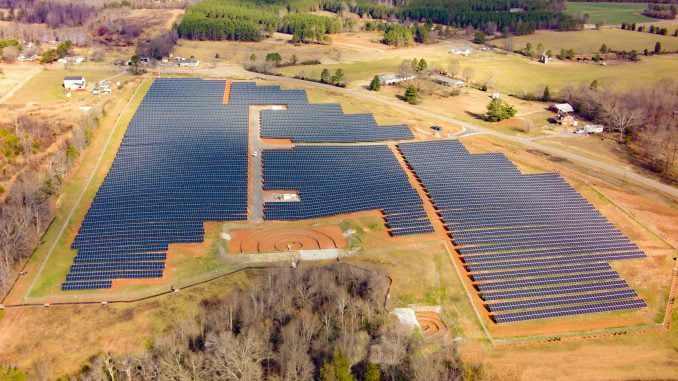
RALEIGH — The N.C. House of Representatives released details of energy policy reform legislation Monday that aims to reshape the relationship between traditional utilities and renewable energy providers after a decades-long arranged marriage through the Renewable Energy Portfolio Standards (REPS) laws passed in 2007. House Bill 589, Balanced Energy Solutions for North Carolina, is being spearheaded by Rep. John Szoka (R-Cumberland) and Rep. Dean Arp (R-Union).”House Bill 589 is a major step forward in energy policy to ensure North Carolina remains competitive in the global economy in which we live,” Joseph Kyzer, communications director for Speaker Tim Moore (R-Kings Mountain) said in a statement. “This legislation represents agreement among a very diverse group of renewable energy, customer advocate and utility organizations after almost a year of stakeholders negotiations.”
Moore and Senate leader Phil Berger (R-Rockingham) convened an energy stakeholders group in September 2016 to achieve a consensus reform package that mitigated energy costs to customers and introduced a more competitive bidding process to satisfy renewable energy requirements.”I appreciate the tireless efforts of Reps. Arp and Szoka finding a path forward to revolutionizing North Carolina’s energy policies with the support of power providers and utilities to control costs for customers and encourage a diverse, competitive marketplace that attracts new businesses and jobs into our economy,” said Moore.The bill would amend various laws related to energy policy, including reform of the State implementation of the Public Utilities Regulatory Policy Act (PURPA), the creation of a competitive bidding process for new renewable energy resources, and the enactment of the Distributed Resources Access Act to authorize leasing of third-party owned solar development.
The proposal would require utilities to offer standard contracts to small power production facilities for up to 10-year terms for facilities that have a capacity up to 1 megawatt. The standard contract for 1 MW facilities would be capped to a total aggregate of 100 MW per public utility.It would also require that capacity payments be made only when capacity is needed by the utility based on need for that resource, as established by the utility’s statutorily required integrated resource plan, plans which are approved by the N.C. Utilities Commission.Highlights of the bill include a competitive bidding process for solar developers that allows cost savings for electric customers and provides for favorable siting locations. These changes will reform elements of the existing PURPA rules that regulate contracts between renewable providers and the utilities that are mandated to purchase their energy.Bill sponsors said the reforms are needed to ensure that electric customers across the state can take advantage of savings as solar energy becomes more cost-competitive. However, the legislation does not eliminate or reduce the mandate that utilities purchase a certain percentage of their energy from renewable sources.
The competitive bidding process would be overseen by an independent administrator that would be required to publish the methodology used to choose the projects. The public utility would also have to disclose any non-publicly available information concerning its own system in preparing its bid to other bidders.The costs to of procurement would be eligible to be recovered by the utility through an annual rider. The annual costs recoverable, however, would not be allowed to exceed 1 percent of total revenues of the utility in the state for the prior calendar year.
In December 2013, the N.C. Utilities Commission approved a three-year Green Source Rider pilot program designed to give large energy customers the option of offsetting some or all of their energy consumption with renewable energy resources in the Duke Energy Carolinas service territory. The Green Source Rider Program is re-initiated under this proposal, allowing large utility customers to work directly with renewable energy developers to purchase the type of energy companies require to achieve their own sustainability goals.House Bill 589 also creates a solar leasing program where energy customers can work with private third parties to install renewable energy features with little or no upfront cost. The bill also reforms purchase agreements between utilities and customers that have renewable energy installations on their homes or businesses. Currently, a utility is required to purchase excess customer-generated energy, from rooftop solar panels for instance, essentially at retail rates.Under current law, electric public utilities in the state have the exclusive rights to sell electricity in a designated franchise area. Third-party financing models are not available because solar developers are not authorized to sell power back to the consumer unless they are the regulated public utility serving that franchise area.
However, retail customers can own a renewable energy systems for their own primary use and are compensated through bill credits under a net metering rate. H.B. 589 would enact the Distributed Resources Access Act to allow third parties to offer leasing of solar energy facilities in the service area of an offering utility or a municipality that offers electric service and to create a community solar energy program to be implemented by the offering utility.The bill also includes a study of energy storage and a path for swine and poultry waste-to-energy development and connection to the North Carolina electric grid.H.B. 589 is expected to be heard in House committee Tuesday and reach the floor of the House for initial votes later this week.



